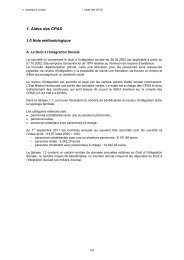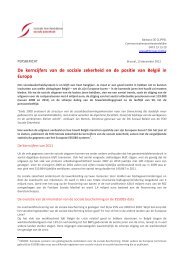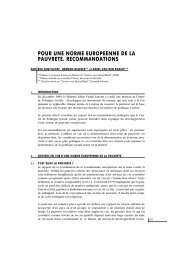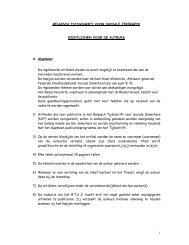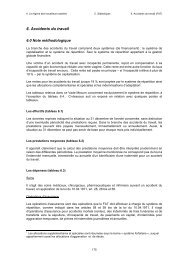- Page 5 and 6:
TRAVAIL AU NOIR ET FRAUDE :UNE MENA
- Page 7 and 8:
TRAVAIL AU NOIR ET FRAUDE : UNE TRI
- Page 9 and 10:
TRAVAIL AU NOIR ET FRAUDE : UNE TRI
- Page 11 and 12:
TRAVAIL AU NOIR ET FRAUDE : UNE TRI
- Page 13 and 14:
TRAVAIL AU NOIR ET FRAUDE : UNE TRI
- Page 15 and 16:
TRAVAIL AU NOIR ET FRAUDE : UNE TRI
- Page 17 and 18:
TRAVAIL AU NOIR ET FRAUDE : UNE TRI
- Page 19 and 20:
FRAUDE SOCIALE ET TRAVAIL AU NOIREN
- Page 21 and 22:
FRAUDE SOCIALE ET TRAVAIL AU NOIR E
- Page 23 and 24:
FRAUDE SOCIALE ET TRAVAIL AU NOIR E
- Page 25 and 26:
FRAUDE SOCIALE ET TRAVAIL AU NOIR E
- Page 27 and 28:
FRAUDE SOCIALE ET TRAVAIL AU NOIR E
- Page 29 and 30:
FRAUDE SOCIALE ET TRAVAIL AU NOIR E
- Page 31 and 32:
FRAUDE SOCIALE ET TRAVAIL AU NOIR E
- Page 33 and 34:
FRAUDE SOCIALE ET TRAVAIL AU NOIR E
- Page 35 and 36:
FRAUDE SOCIALE ET TRAVAIL AU NOIR E
- Page 37 and 38:
FRAUDE SOCIALE ET TRAVAIL AU NOIR E
- Page 39 and 40:
FRAUDE SOCIALE ET TRAVAIL AU NOIR E
- Page 41 and 42:
FRAUDE SOCIALE ET TRAVAIL AU NOIR E
- Page 43 and 44:
FRAUDE SOCIALE ET TRAVAIL AU NOIR E
- Page 46 and 47:
REVUEBELGEDESECURITESOCIALE- 3e TRI
- Page 48 and 49:
REVUEBELGEDESECURITESOCIALE- 3e TRI
- Page 50 and 51:
REVUEBELGEDESECURITESOCIALE- 3e TRI
- Page 52 and 53:
REVUEBELGEDESECURITESOCIALE- 3e TRI
- Page 54 and 55:
REVUEBELGEDESECURITESOCIALE- 3e TRI
- Page 56 and 57:
POURQUOI VOULOIR RENDRE A CESARCE Q
- Page 58 and 59:
POURQUOI VOULOIR RENDRE A CESAR CE
- Page 60 and 61:
POURQUOI VOULOIR RENDRE A CESAR CE
- Page 62 and 63:
POURQUOI VOULOIR RENDRE A CESAR CE
- Page 64 and 65:
TRAVAIL AU NOIR ET FRAUDE :LES AMEN
- Page 66 and 67:
TRAVAIL AU NOIR ET FRAUDE : LES AME
- Page 68 and 69:
TRAVAIL AU NOIR ET FRAUDE : LES AME
- Page 70 and 71:
TRAVAIL AU NOIR ET FRAUDE : LES AME
- Page 72 and 73:
TRAVAIL AU NOIR ET FRAUDE : LES AME
- Page 74 and 75:
TRAVAIL AU NOIR ET FRAUDE : LES AME
- Page 76 and 77:
LA POLITIQUE DE L’ADMINISTRATION
- Page 78 and 79:
LA POLITIQUE DE L’ADMINISTRATION
- Page 80 and 81:
LA POLITIQUE DE L’ADMINISTRATION
- Page 82 and 83:
TRAVAIL AU NOIR ET FRAUDE : UNEMENA
- Page 84 and 85:
TRAVAIL AU NOIR ET FRAUDE : UNE MEN
- Page 86 and 87:
TRAVAIL AU NOIR ET FRAUDE : UNE MEN
- Page 88 and 89:
REVUE BELGE DE SECURITE SOCIALE - 3
- Page 90 and 91:
REVUE BELGE DE SECURITE SOCIALE - 3
- Page 92 and 93:
REVUE BELGE DE SECURITE SOCIALE - 3
- Page 94 and 95:
REVUE BELGE DE SECURITE SOCIALE - 3
- Page 96 and 97:
REVUE BELGE DE SECURITE SOCIALE - 3
- Page 98 and 99:
LUTTE CONTRE LA GRANDE FRAUDEFISCAL
- Page 100 and 101:
LUTTE CONTRE LA GRANDE FRAUDE FISCA
- Page 102 and 103:
LUTTE CONTRE LA GRANDE FRAUDE FISCA
- Page 104 and 105:
LUTTE CONTRE LA GRANDE FRAUDE FISCA
- Page 106 and 107:
LUTTE CONTRE LA GRANDE FRAUDE FISCA
- Page 108 and 109:
PARTIE 2 :TRAVAIL AU NOIR ET FRAUDE
- Page 110 and 111:
REVUE BELGE DE SECURITE SOCIALE - 3
- Page 112 and 113:
REVUE BELGE DE SECURITE SOCIALE - 3
- Page 114 and 115:
REVUE BELGE DE SECURITE SOCIALE - 3
- Page 116 and 117:
REVUE BELGE DE SECURITE SOCIALE - 3
- Page 118 and 119:
REVUE BELGE DE SECURITE SOCIALE - 3
- Page 120 and 121:
REVUE BELGE DE SECURITE SOCIALE - 3
- Page 122 and 123:
REVUE BELGE DE SECURITE SOCIALE - 3
- Page 124 and 125:
REVUE BELGE DE SECURITE SOCIALE - 3
- Page 126 and 127:
REVUE BELGE DE SECURITE SOCIALE - 3
- Page 128 and 129:
REVUE BELGE DE SECURITE SOCIALE - 3
- Page 130 and 131:
REVUE BELGE DE SECURITE SOCIALE - 3
- Page 132 and 133:
REVUE BELGE DE SECURITE SOCIALE - 3
- Page 134 and 135:
REVUE BELGE DE SECURITE SOCIALE - 3
- Page 136 and 137:
REVUE BELGE DE SECURITE SOCIALE - 3
- Page 138 and 139:
REVUE BELGE DE SECURITE SOCIALE - 3
- Page 140 and 141:
REVUE BELGE DE SECURITE SOCIALE - 3
- Page 142 and 143:
REVUE BELGE DE SECURITE SOCIALE - 3
- Page 144 and 145:
REVUE BELGE DE SECURITE SOCIALE - 3
- Page 146 and 147:
REVUE BELGE DE SECURITE SOCIALE - 3
- Page 148 and 149:
REVUE BELGE DE SECURITE SOCIALE - 3
- Page 150 and 151:
LES ECONOMIES SOUTERRAINES DANS LEM
- Page 152 and 153:
LES ECONOMIES SOUTERRAINES DANS LE
- Page 154 and 155:
LES ECONOMIES SOUTERRAINES DANS LE
- Page 156 and 157:
LES ECONOMIES SOUTERRAINES DANS LE
- Page 158 and 159:
LES ECONOMIES SOUTERRAINES DANS LE
- Page 160 and 161:
LES ECONOMIES SOUTERRAINES DANS LE
- Page 162 and 163:
LES ECONOMIES SOUTERRAINES DANS LE
- Page 164 and 165:
LES ECONOMIES SOUTERRAINES DANS LE
- Page 166 and 167:
LES ECONOMIES SOUTERRAINES DANS LE
- Page 168 and 169:
LES ECONOMIES SOUTERRAINES DANS LE
- Page 170 and 171:
LES ECONOMIES SOUTERRAINES DANS LE
- Page 172 and 173:
LES ECONOMIES SOUTERRAINES DANS LE
- Page 174 and 175:
LES ECONOMIES SOUTERRAINES DANS LE
- Page 176 and 177:
LES ECONOMIES SOUTERRAINES DANS LE
- Page 178 and 179:
LES ECONOMIES SOUTERRAINES DANS LE
- Page 180 and 181:
LES ECONOMIES SOUTERRAINES DANS LE
- Page 182 and 183:
LES ECONOMIES SOUTERRAINES DANS LE
- Page 184 and 185:
LES ECONOMIES SOUTERRAINES DANS LE
- Page 186 and 187:
LES ECONOMIES SOUTERRAINES DANS LE
- Page 188 and 189:
LES ECONOMIES SOUTERRAINES DANS LE
- Page 190 and 191:
LES ECONOMIES SOUTERRAINES DANS LE
- Page 192 and 193:
LES ECONOMIES SOUTERRAINES DANS LE
- Page 194 and 195:
LES ECONOMIES SOUTERRAINES DANS LE
- Page 196 and 197:
LES ECONOMIES SOUTERRAINES DANS LE
- Page 198 and 199:
LES ECONOMIES SOUTERRAINES DANS LE
- Page 200 and 201:
LES ECONOMIES SOUTERRAINES DANS LE
- Page 202 and 203:
LES ECONOMIES SOUTERRAINES DANS LE
- Page 204 and 205:
LES ECONOMIES SOUTERRAINES DANS LE
- Page 206 and 207:
LES ECONOMIES SOUTERRAINES DANS LE
- Page 208 and 209:
LES SERVICES DOMESTIQUES ETL’ECON
- Page 210 and 211:
LES SERVICES DOMESTIQUES ET L’ECO
- Page 212 and 213:
LES SERVICES DOMESTIQUES ET L’ECO
- Page 214 and 215:
LES SERVICES DOMESTIQUES ET L’ECO
- Page 216 and 217:
LES SERVICES DOMESTIQUES ET L’ECO
- Page 218 and 219:
TRAVAIL DOMESTIQUE FOURNI PAR DESTI
- Page 220 and 221:
TRAVAIL DOMESTIQUE FOURNI PAR DES T
- Page 222 and 223:
TRAVAIL DOMESTIQUE FOURNI PAR DES T
- Page 224 and 225:
LA PREVENTION DE LA FRAUDE :CONDITI
- Page 226 and 227:
LA PREVENTION DE LA FRAUDE : CONDIT
- Page 228 and 229:
LA PREVENTION DE LA FRAUDE : CONDIT
- Page 230 and 231:
2. Examen par paysL’ECONOMIE SOUT
- Page 232 and 233:
REVUE BELGE DE SECURITE SOCIALE - 3
- Page 234 and 235:
REVUE BELGE DE SECURITE SOCIALE - 3
- Page 236 and 237:
REVUE BELGE DE SECURITE SOCIALE - 3
- Page 238 and 239:
REVUE BELGE DE SECURITE SOCIALE - 3
- Page 240 and 241:
REVUE BELGE DE SECURITE SOCIALE - 3
- Page 242 and 243:
REVUE BELGE DE SECURITE SOCIALE - 3
- Page 244 and 245:
REVUE BELGE DE SECURITE SOCIALE - 3
- Page 246 and 247:
REVUE BELGE DE SECURITE SOCIALE - 3
- Page 248 and 249:
REVUE BELGE DE SECURITE SOCIALE - 3
- Page 250 and 251:
REVUE BELGE DE SECURITE SOCIALE - 3
- Page 252 and 253:
REVUE BELGE DE SECURITE SOCIALE - 3
- Page 254 and 255:
REVUE BELGE DE SECURITE SOCIALE - 3
- Page 256 and 257:
REVUE BELGE DE SECURITE SOCIALE - 3
- Page 258 and 259:
REVUE BELGE DE SECURITE SOCIALE - 3
- Page 260 and 261:
REVUE BELGE DE SECURITE SOCIALE - 3
- Page 262 and 263:
REVUE BELGE DE SECURITE SOCIALE - 3
- Page 264 and 265:
REVUE BELGE DE SECURITE SOCIALE - 3
- Page 266 and 267:
REVUE BELGE DE SECURITE SOCIALE - 3
- Page 268 and 269:
REVUE BELGE DE SECURITE SOCIALE - 3
- Page 270 and 271:
REVUE BELGE DE SECURITE SOCIALE - 3
- Page 272 and 273:
REVUE BELGE DE SECURITE SOCIALE - 3
- Page 274 and 275:
REVUE BELGE DE SECURITE SOCIALE - 3
- Page 276 and 277:
REVUE BELGE DE SECURITE SOCIALE - 3
- Page 278 and 279:
REVUE BELGE DE SECURITE SOCIALE - 3
- Page 280 and 281:
REVUE BELGE DE SECURITE SOCIALE - 3
- Page 282 and 283:
REVUE BELGE DE SECURITE SOCIALE - 3
- Page 284 and 285:
REVUE BELGE DE SECURITE SOCIALE - 3
- Page 286 and 287:
REVUE BELGE DE SECURITE SOCIALE - 3
- Page 288 and 289:
REVUE BELGE DE SECURITE SOCIALE - 3
- Page 290 and 291:
REVUE BELGE DE SECURITE SOCIALE - 3
- Page 292 and 293:
REVUE BELGE DE SECURITE SOCIALE - 3
- Page 294 and 295:
REVUE BELGE DE SECURITE SOCIALE - 3
- Page 296 and 297:
REVUE BELGE DE SECURITE SOCIALE - 3
- Page 298 and 299:
REVUE BELGE DE SECURITE SOCIALE - 3
- Page 300 and 301:
REVUE BELGE DE SECURITE SOCIALE - 3
- Page 302 and 303:
REVUEBELGEDESECURITESOCIALE- 3e TRI
- Page 304 and 305:
REVUEBELGEDESECURITESOCIALE- 3e TRI
- Page 306 and 307:
REVUEBELGEDESECURITESOCIALE- 3e TRI
- Page 308 and 309:
REVUEBELGEDESECURITESOCIALE- 3e TRI
- Page 310 and 311:
REVUEBELGEDESECURITESOCIALE- 3e TRI
- Page 312 and 313:
REVUEBELGEDESECURITESOCIALE- 3e TRI
- Page 314 and 315:
REVUEBELGEDESECURITESOCIALE- 3e TRI
- Page 316 and 317:
REVUEBELGEDESECURITESOCIALE- 3e TRI
- Page 318 and 319:
REVUEBELGEDESECURITESOCIALE- 3e TRI
- Page 320 and 321:
REVUEBELGEDESECURITESOCIALE- 3e TRI
- Page 322 and 323:
REVUEBELGEDESECURITESOCIALE- 3e TRI
- Page 324 and 325:
REVUEBELGEDESECURITESOCIALE- 3e TRI
- Page 326 and 327:
REVUE BELGE DE SECURITE SOCIALE - 3
- Page 328 and 329:
REVUE BELGE DE SECURITE SOCIALE - 3
- Page 330 and 331:
REVUE BELGE DE SECURITE SOCIALE - 3
- Page 332 and 333:
REVUE BELGE DE SECURITE SOCIALE - 3
- Page 334 and 335: REVUE BELGE DE SECURITE SOCIALE - 3
- Page 336 and 337: REVUE BELGE DE SECURITE SOCIALE - 3
- Page 338 and 339: REVUE BELGE DE SECURITE SOCIALE - 3
- Page 340 and 341: REVUE BELGE DE SECURITE SOCIALE - 3
- Page 342 and 343: REVUE BELGE DE SECURITE SOCIALE - 3
- Page 344 and 345: REVUE BELGE DE SECURITE SOCIALE - 3
- Page 346 and 347: REVUE BELGE DE SECURITE SOCIALE - 3
- Page 348 and 349: REVUE BELGE DE SECURITE SOCIALE - 3
- Page 350 and 351: 3. Etudes internationales et politi
- Page 352 and 353: REVUE BELGE DE SECURITE SOCIALE - 3
- Page 354 and 355: REVUE BELGE DE SECURITE SOCIALE - 3
- Page 356 and 357: REVUE BELGE DE SECURITE SOCIALE - 3
- Page 358 and 359: REVUE BELGE DE SECURITE SOCIALE - 3
- Page 360 and 361: REVUE BELGE DE SECURITE SOCIALE - 3
- Page 362 and 363: REVUE BELGE DE SECURITE SOCIALE - 3
- Page 364 and 365: FORUMDU ‘‘PIEGE A LEMPLOI’’
- Page 366 and 367: REVUE BELGE DE SECURITE SOCIALE - 3
- Page 368 and 369: REVUE BELGE DE SECURITE SOCIALE - 3
- Page 370 and 371: REVUE BELGE DE SECURITE SOCIALE - 3
- Page 372 and 373: REVUE BELGE DE SECURITE SOCIALE - 3
- Page 374 and 375: ABSTRACTSABSTRACTS“Fraude sociale
- Page 376 and 377: ABSTRACTS“Lutte contre la grande
- Page 378 and 379: ABSTRACTS“L’économie souterrai
- Page 380 and 381: ABSTRACTSsous-déclarations. Elles
- Page 382 and 383: ABSTRACTSOne reason for these diffe
- Page 386 and 387: ABSTRACTSIn the first section we de
- Page 388 and 389: Le texte intégral de la Revue peut



